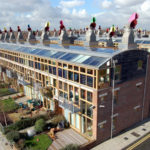 The United States has a severe shortage of affordable housing, and most people agree that more should be built. However, support often fades when projects are proposed in their own neighborhoods. Research from Stanford shows that this opposition is driven by negative emotions and racist beliefs about affordable housing.
The United States has a severe shortage of affordable housing, and most people agree that more should be built. However, support often fades when projects are proposed in their own neighborhoods. Research from Stanford shows that this opposition is driven by negative emotions and racist beliefs about affordable housing.
Though people generally support the idea of affordable housing, local projects often face strong pushback. This resistance usually comes from a small but loud segment of the community, not the majority. So, while the country agrees on the need for affordable housing, building it locally reveals deeper societal issues.
“When you look at broad, national surveys, people often say, ‘We like affordable housing!’ but the reality is that local opposition by the public at city meetings is still a large barrier,” the researchers explain. “So we wanted to understand more about what was shaping opinions to see how we might motivate positive action.”
Support for affordable housing
The researchers examined what influences support for affordable housing in neighborhoods. They found that people’s emotional reactions can turn general support into opposition when it comes to local projects.
The study suggests these reactions often stem from unconscious biases, like racism or classism. Addressing these biases could help increase support for affordable housing developments.
“We really wanted to see how this emotional response, which may be partly driven by unconscious racism or classism, paired with more conscious racism,” the researchers explain.
“There’s been a call in urban planning to grapple with people’s emotional responses to the built environment, and to recognize that these emotional responses—while they may be hard to understand and deal with—have a lot of impact.”
Lack of affordability
According to the National Low Income Housing Coalition, there are only 34 affordable and available rental homes for every 100 extremely low-income households in the U.S. To bridge this gap, the country needs an additional 7.3 million affordable homes.
Researchers conducted an online survey with 534 participants across the U.S. They found that while most participants supported affordable housing at the state, city, and neighborhood levels, opposition more than doubled when it came to local developments.
Their results echoed findings from a study conducted a decade ago: Wealthier individuals, suburban residents, and conservatives were less supportive of affordable housing in their neighborhoods. Those with more trust in the federal government were more supportive.
Minimal support
New trends also emerged: People with higher education levels or those living in single-family homes were less supportive, while those who had lived in their neighborhood for over 10 years or had personal experience with affordable housing were more supportive.
The strongest predictors of opposition were racism, measured through symbolic racism beliefs, and negative emotional reactions to affordable housing. While the impact of symbolic racism is well-documented, the role of initial emotional responses, potentially stemming from unconscious biases, is a new finding.
The study also found that these factors interacted with certain demographics at the neighborhood level. For instance, suburban residents had more negative emotional responses to affordable housing and were more likely to oppose local developments. This opposition was not linked to symbolic racism, emphasizing the significant role of emotional reactions and potential unconscious biases.
An interdisciplinary solution
It’s somewhat unusual for civil engineers to lead an interdisciplinary study on racism and emotional responses, but the authors argue that engineers must address these biases to successfully build more affordable housing.
“A lot of times, arguing over the buildings is used as a more socially acceptable way to protest affordable housing projects,” the researchers explain. “We’re going to be dealing with the effects of racism in our projects, and we need to be able to talk about that and address it.”
The researchers view this initial work as a starting point for understanding how engineers can help increase support for affordable housing developments. People’s biases—both conscious and unconscious—affect their perceptions of the built environment and shape their opinions on affordable housing.
By understanding these root causes, the researchers hope to work more effectively to address them. They continue to investigate how the built environment affects public perceptions and aim to collaborate with partner organizations that focus on racial justice and equity to develop strategies for improving local responses to affordable housing developments.
“Affordable housing impacts many aspects that are tied to both individual well-being and community well-being,” the authors conclude. “We need to work to change the narrative in the public’s mind about what affordable housing is and can be for society as a whole.”